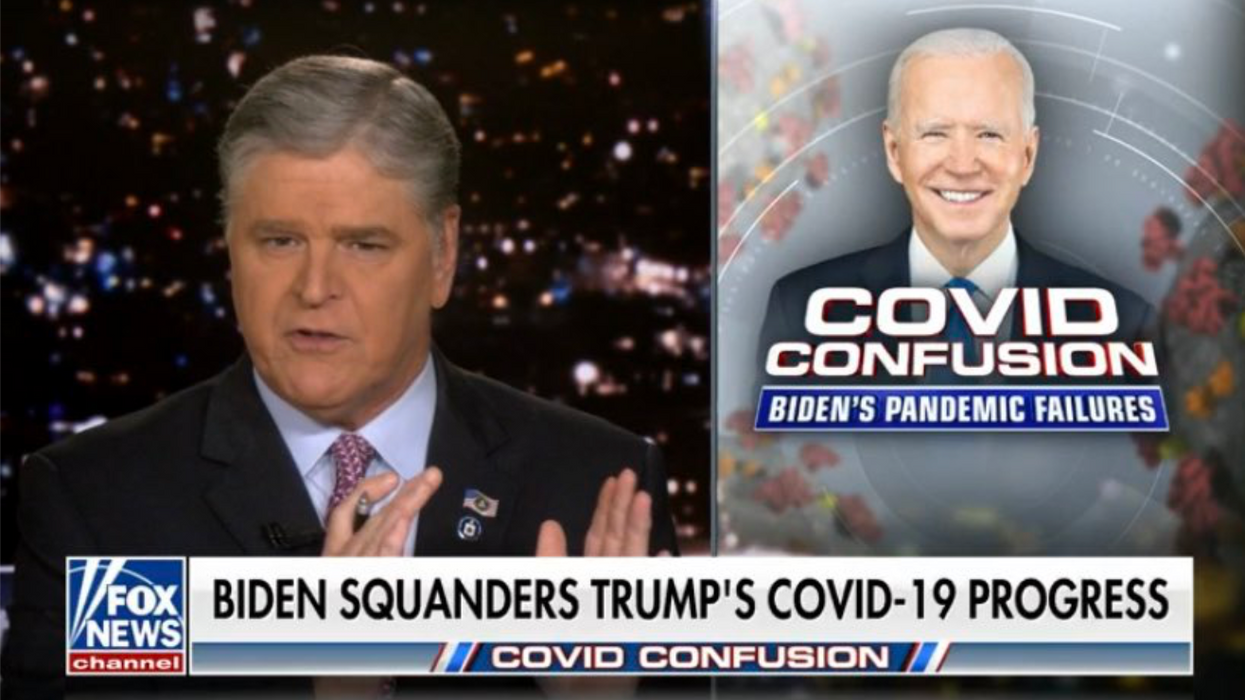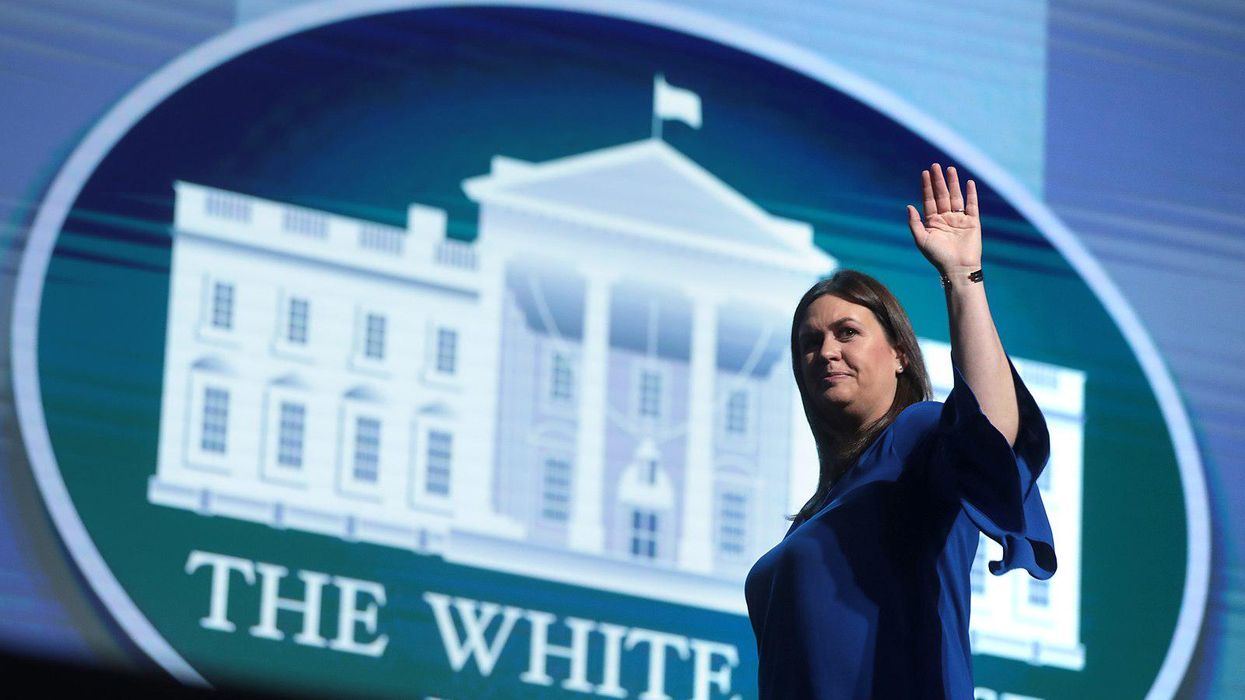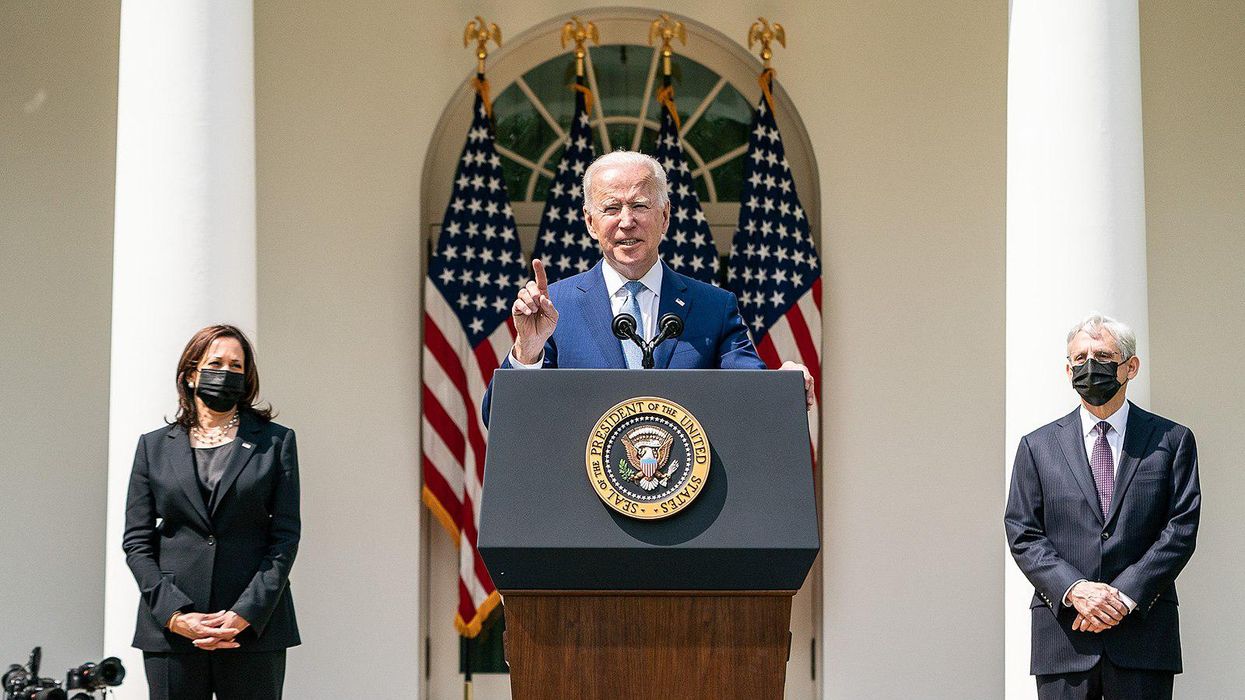Reprinted with permission from TomDispatch
Now that we're all unmasking and the economy seems set to roar into the 2020s, what will we remember about how disastrously, how malignantly, the Trump administration behaved as the pandemic took hold? And will anyone be held to account for it?
The instinct to forget pandemics, as I've pointed out when it came to the 1918 "Spanish flu," has historically been strong indeed. In these years, the urge to forget official malfeasance and move on has, it turns out, been at least as strong. Washington's failure to investigate and bring to account those who led the nation and ultimately the world into the folly of the Iraq War may be the most egregious recent example of this.
In the end, that's why I wrote my new book Virus — to memorialize a clear and accessible historical record of the deliberate and deadly decision-making that swept us all into a kind of hell. I had the urge to try to stop what happened to us from being instantly buried in the next round of daily reporting or, as appears likely now, relegated to the occasional voluminous government or foundation report on how to do things better.
In the early months of 2020, as rumors of distant death morphed into announcements of an imminent pandemic, followed by a patchwork of state and local lockdowns, most Americans were too stunned by daily events to absorb the bigger picture. Memories of those days still click by like surreal snapshots: prepper shopping, toilet-paper hoarders, forklifts moving bodies into refrigerated trucks, and a capricious leader on TV night after endless night talking about quack cures, his own ratings, and how he "liked the numbers low." Meanwhile, he left desperate states to compete with each other for badly needed protective gear.
What looked like chaos or ad hoc decision-making by an improbably elected fraudster president was, in fact, deeply rooted in ideology; specifically, in the belief that the job of the government was neither to exercise leadership, nor activate government agencies to assist the American people. It was to promote private industry and its profits as the solution to anything and everything pandemic.
That ideology led to profiteering, politicized science, and mass death. Now, as the pandemic wanes (at least for the time being, though not necessarily for the unvaccinated) in this country, it deserves an investigation. Somewhere between almost 600,000 and more than 900,000Americans have died so far from Covid-19, a significant number of those deaths unnecessary, as even the former administration's medical expert, Dr Deborah Birx, has said.
The virus arrived in America after the Trump administration — steered by right-wing Heritage Foundation policy wonks and their donor-class comrades — had already laid waste to key agencies like Health and Human Services (HHS) and the Centers for Disease Control. Their instant response to the pandemic was to similarly sideline government emergency-management experts, put inexperienced 20-something volunteers in charge of finding and distributing protective gear, and circulate lists of possible suppliers — one of whom, typically enough, a Silicon Valley entrepreneur with no medical contracting experience, snagged a cool $86-million contract from the state of New York for ventilators he would never deliver.
While most of the country hunkered down in a state of stunned paralysis, a faction of Trumpworld recognized the pandemic not for what it took away — human lives and livelihoods — but for what it offered. The chaos of the moment allowed them to road-test their dream system, to prove once and for all that the forces of supply and demand, the instinct to make a buck, could do a better job managing a natural disaster than the government of the United States and its bureaucrats.
Is any of this likely to be investigated? Will anyone be held accountable for what appears to have been a response deliberately mismanaged by religious zealots and crony capitalists, crews equally cynical about expertise, science, and the government's ability to prevent or ameliorate disaster?
What We Don't Know About The Trump Pandemic Disaster
Here, as a start, is a rundown of where inquiries into that disaster now stand.
Buried in the alphabet soup of the Coronavirus Aid, Relief, and Economic Security, or CARES, Act is the Pandemic Response Accountability Committee (PRAC), established in March 2020 to keep track of the federal money (by now $5.5 trillion) that was to be spent on the pandemic. It's a consortium of agency inspector generals, headed by Michael Horowitz, a career Department of Justice lawyer. His name will be familiar to anyone who followed the Trump-Russia investigations. He produced a report in 2019 that — to the dismay of Trump's supporters — failed to conclude that the FBI had begun investigating connections between Vladimir Putin's Russia and the Trump campaign without legal cause and as a political dirty trick.
PRAC is authorized to conduct oversight of pandemic-related emergency spending of any sort. Its inspector generals have already issued nearly 200 pandemic-related oversight reports and charged 474 people with trying to steal more than $569 million. (Details in its quarterly reports are available online.)
While PRAC has been genuinely nonpartisan in its acts, its focus so far has been on the small fry of the pandemic era, not the truly big fish. In its most recent semi-annual report, for example, it makes clear that 55 percent of its charges had to do with fraud in the Paycheck Protection Program and 40 percent were related to fraudulent unemployment assistance claims. Among the bigger PRAC successes: charging a Texas man in a $24-million Covid-relief fraudulent loan scheme last October and seven men in another fraud scheme in which they used their ill-gotten pandemic gains to buy, among other things, a Porsche and a Lamborghini.
The CARES Act also authorized the Government Accountability Office (GAO) to monitor the federal response to the pandemic. Its most recent semi-annual report included 16 recommendations in selected public-health areas like testing, vaccines, and therapeutics, only one of which has so far been implemented. A source at the GAO told me that a report on some contracting irregularities can be expected this summer.
So far, such government self-assessments have shown little appetite for dealing with the true cronyism, profiteering, and disastrous politicization of the federal pandemic response by Trump's minions. Among the schemes begging for a deeper look is Operation Airbridge. Led by the president's son-in-law, Jared Kushner, it was an attempt to use federal funds to underwrite the air-shipping costs of private companies in an effort to speed the delivery of the kinds of personal protective equipment that were in such short supply last spring. That unorthodox effort included large no-bid contracts granted to a small group of private health-care companies without restrictions on pricing or even on where the desperately needed products were to be delivered.
In the spring of 2020, as hospital workers began popping up on social media and network news programs clad only in garbage bags and makeshift or reused face masks, sometimes in tears and pleading for help, the White House maintained its focus on private enterprise as the way out of the disaster. The administration called for volunteers to staff what would become another public/private bonanza, the White House Covid-19 Supply Chain Task Force, also helmed by Trump family fixer, Jared Kushner.
We don't know what, if anything, Kushner's group actually accomplished. The audacity of the former administration's disregard for federal rules and regulations coupled with the scale of the no-bid contracts they issued certainly attracted political pushback at the time. Democrats and civil-society groups in Washington filed requests for more information about how such contracts had eluded federal guidelines, and where the supplies actually went.
It's possible, however, that we may never know.
Ventilating Money
In April 2020, a group of Democratic senators led by Elizabeth Warren, citing the administration's secrecy, opened an investigation into the operation. They sent a letter to the six Operation Airbridge beneficiary health-care giants — Cardinal Health, Concordance, Henry Schein, McKesson, Medline, and Owens & Minor — requesting explanations for reports of "political favoritism, cronyism, and price-gouging" in the ongoing supply effort. "Taxpayers have shelled out tens of millions of dollars on this secretive project and they deserve to know whether it actually helped get critical supplies to the areas most in need," Warren said that June.
Three of the six suppliers did, in the end, give the senators copies of memorandums of agreement (MOAs) indicating that they "had complete discretion about how to distribute supplies across hotspot counties" and that "nothing in the MOAs appears to prevent a supplier from sending all of its supplies designated for hotspots to just a single customer in one of the hotspots." The government hadn't, in fact, put any kind of conditions on the cost for that protective equipment and the Trump Justice Department would insist that it was none of its business how suppliers arrived at the prices they charged for it.
Using taxpayer funds to grease private enrichment was, of course, a Trump family tradition, going back to the Eisenhower years when Donald's father, Fred, fleeced the government of millions of dollars in loans aimed at housing World War II veterans. Hauled down to Capitol Hill to explain himself, the New York builder was unrepentant, arguing that a loophole in the law allowed for his private gain and, under such circumstances, only a fool would have left all that money on the table.
What, from the outside, came to look like White House inspired chaos — of which Operation Airbridge was just one example — should, in fact, be seen as a deliberate effort to disengage the federal government and leave the blame and the logistics problems to Covid-afflicted states, at the time mostly run by Democrats.
On March 24, 2020, for instance, New York Governor Andrew Cuomo begged the federal government to help get more ventilators for what was clearly going to be a surge of coronavirus patients. (New York City's health-care system was already overwhelmed by then.) At the time, hooking patients up to ventilators seemed like the best way to go, though doctors later realized that, for many patients, the tricky disease could be foiled earlier with anticlotting and steroid medication.
"How can you have New Yorkers possibly dying because they can't get a ventilator?" asked Cuomo. Three days later, Trump tweeted, "General Motors must… start making ventilators, now! Ford, get going on ventilators, fast!"
Yaron Oren-Pines, an electrical engineer for tech firms like Google, tweeted back at the president, "We can supply ICU ventilators, invasive and non-invasive." Within days, he turned up on a list vetted by Kushner's team of volunteers and, at their recommendation, officials in New York closed a deal with him.
The only problem: Oren-Pines had no ventilators and had never been in the medical supply business. When he failed to deliver on the $86 million deal, Wells Fargo froze his account and New York canceled the order, demanding the money back, though by summer 2020, it had yet to collect a final $10 million.
The Great Forgetting?
In addition to making various large or politically well-connected health-care companies far wealthier, the administration also lavished staggering billions on a small group of Big Pharma firms for Operation Warp Speed, the project it backed to develop vaccines and medicines to treat Covid-19. Those contracts, too, were written outside normal government channels and the companies themselves were chosen by a panel of industry insiders without any oversight. Many of them stood to (and did) profit from the soaring stock prices of those firms when the news about clinical trial successes was released.
In November 2020, to launch an investigation into that situation, Senator Warren teamed up with Representative Katie Porter (D-CA) to request copies of all federal contracts for Covid-19 therapeutics and vaccines. "The American people," they stated, "deserve to know that the federal government is using their tax dollars to develop Covid-19 medical products at the best possible price for the public — not to line the pockets of wealthy companies by cutting corners in consumer protection, pricing, and quality."
Warren raised questions about a Department of Health and Human Services deal with Gilead Sciences for the pandemic therapeutic remdesivir (part of the "cocktail" of drugs administered to Donald Trump and other Republican insiders like Chris Christie and Rudy Giuliani when they got Covid). HHS had indeed acquired a large supply of remdesivir at an exorbitant cost to American taxpayers and Gilead itself would charge American hospitals $3,200 per treatment for it, $860 more than its price in other developed countries.
In addition to Warren, who sent a letter to the administration requesting information on HHS's pricing negotiations with Gilead for the drug, other people also stood up. Whistleblower Dr. Rick Bright, former director of the Biomedical Advanced Research and Development Agency (BARDA), for instance, filed a whistleblower complaint alleging that Dr. Robert Kadlec, a Trump HHS political appointee, had engaged in multiple schemes to funnel contracts to politically connected companies — and that this had begun even before the pandemic was even a reality. According to Bright, Kadlec then pushed him out of the government, despite the fact that federal law officially protects whistleblowers.
In his complaint, among other things, Bright alleged that in 2017, a Kadlec friend and Big Pharma consultant pressured the agency to maintain a contract with a company owned by a friend of Jared Kushner's, even after an independent review determined it should be cancelled. Bright testified before Congress, and the fate of his whistleblower suit remains to be litigated.
As for the rest of the inquiries, so far, money and power appear to have eluded the investigators. It's unclear whether Senator Warren's and Representative Porter's requests met with any response from the former administration, or even whether they've continued their inquiry into Big Pharma and no-bid contracting. They have made no further announcements and neither office replied to requests for updates.
You won't be surprised to learn, I'm sure, that the name "Jared Kushner" is so far not to be found in GAO or PRAC reports.
The best chance for public accountability — if not legal liability — might be the House of Representatives, especially its Select Subcommittee on the Coronavirus Crisis, launched in April 2020. The Trump administration blew off its subpoenas for former HHS Secretary Alex Azar and then-CDC Director Robert Redfield to testify in December 2020, and blocked documents and witnesses related to politicized data, testing, and supply shortages, among other areas of inquiry. But the subcommittee did manage to expose emails from Trump political appointees, revealing efforts to skew CDC data. It is also investigating some whopping no-bid or sole-contractor deals that the former administration cut with preferred businesses. One was a $354-million four-year contract awarded on a non-competitive basis to PHLOW, which was incorporated in January 2020 to manufacture generic medicines to fight Covid. It's the largest contract ever awarded by BARDA and includes a 10-year option worth $812 million.
And the House has continued to seek transparency. According to a Brookings House Oversight Tracker, as of March 2021, 30 percent of congressional oversight letters and 40 percent of its hearings were related to the federal government's pandemic response. But there are signs that the Biden administration, while more cooperative, is not eager to force agencies to comply with requests the previous administration ignored.
My sense is that the emergency created by the insurrection at the Capitol last January and the desperate need of the new Biden administration to have palpable policy achievements in order to do well in election 2022 has taken the steam out of any inclination to dig deeper into the profiteering, cronyism, political scheming, and chaos with which the Trump administration met the Covid-19 virus. It went far deeper than an article like this can possibly indicate, leaving so many hundreds of thousands of potentially unnecessary deaths in its wake.
Think of it as a memory hole, still brimming with schemes and money.
Nina Burleigh, a TomDispatch regular, is a journalist of American politics and the author of six previous books. Her seventh, Virus: Vaccinations, the CDC, and the Hijacking of America's Response to the Pandemic(just published by Seven Stories Press) is a real-life thriller that delves into the official malfeasance behind America's pandemic chaos and the triumph of science in an era of conspiracy theories and contempt for experts.












